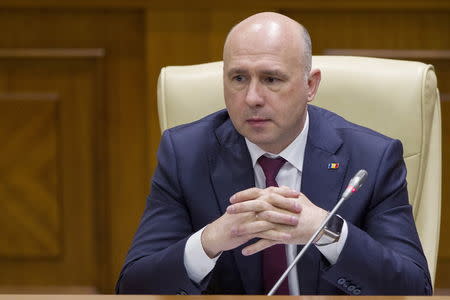Moldovan parliament appoints third PM in less than a year

By Alexander Tanas CHISINAU (Reuters) - Moldovan lawmakers appointed the country's third prime minister in less than a year on Wednesday, backing a man chosen by the president as a compromise candidate in the hopes of ending months of political deadlock. The appointment of Pavel Filip, a member of the main pro-European coalition and a former IT and communications minister in the last government, followed the rejection of two previous candidates. The small ex-Soviet state, Europe's poorest country, has been without a proper government since a no-confidence vote toppled the previous administration in October, after the fraudulent disappearance of $1 billion from the banking system. With a new government in place, Moldova will hope to unlock further funding from overseas lenders, including the International Monetary Fund, that had been withheld in the wake of the banking scandal and the subsequent political crisis. A sharp downtown in neighbouring Russia and drought have added to Moldova's economic woes. Underscoring the scale of the challenge Filip faces, the IMF in a report on Wednesday predicted the economy will have shrunk by 1.75 percent last year, although it did forecast a modest recovery in 2016. "The people of Moldova don't need a government that says pleasant things, but a government that solves their problems," Filip said after the vote, as around 2,000 protesters stood outside parliament still demanding snap elections. A small rowdy group of demonstrators later forced their way into the parliament building after the vote. Moldova's ruling elite has been the target of mass protests over the banking fraud, which saw the equivalent of one-eighth of Moldova's gross domestic product disappear overseas. Despite being touted as a compromise figure, opposition lawmakers resisted Filip's appointment. He has close ties to Vladimir Plahotniuc, one of Moldova's richest but most unpopular men, who was a target of the protests. Filip's party originally wanted Plahotniuc as their candidate for prime minister, but President Nicolae Timofti refused to nominate him. Opposition lawmakers, argued that Plahotniuc would be the real power behind the scenes. The appointment follows the rise and fall of two prime ministers in the past year. Chiril Gaburici resigned last June in the wake of accusations he falsified his school diplomas, while his successor, Valeriu Strelet, was ousted by a no- confidence motion in October. The IMF, which is talks with Moldova about new funding, has urged a clean-up of the financial sector. Insiders say the $1 billion banking fraud, a steady haemorraghing of money in unsupported loans which had been going on for years, reflects deep-seated corruption in Moldova and involved some degree of complicity from many of those in power. "Long-standing deficiencies in identifying ultimate beneficial ownership of banks need to be urgently corrected," the IMF said in its report. (Writing by Matthias Williams; editing by Richard Balmforth)

